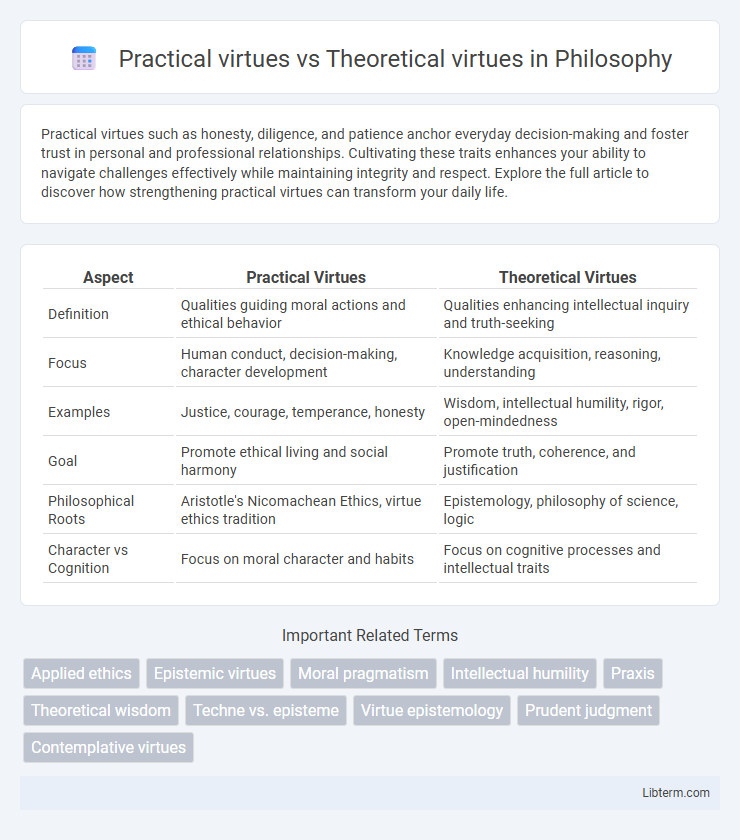Practical virtues such as honesty, diligence, and patience anchor everyday decision-making and foster trust in personal and professional relationships. Cultivating these traits enhances your ability to navigate challenges effectively while maintaining integrity and respect. Explore the full article to discover how strengthening practical virtues can transform your daily life.
Table of Comparison
| Aspect | Practical Virtues | Theoretical Virtues |
|---|---|---|
| Definition | Qualities guiding moral actions and ethical behavior | Qualities enhancing intellectual inquiry and truth-seeking |
| Focus | Human conduct, decision-making, character development | Knowledge acquisition, reasoning, understanding |
| Examples | Justice, courage, temperance, honesty | Wisdom, intellectual humility, rigor, open-mindedness |
| Goal | Promote ethical living and social harmony | Promote truth, coherence, and justification |
| Philosophical Roots | Aristotle's Nicomachean Ethics, virtue ethics tradition | Epistemology, philosophy of science, logic |
| Character vs Cognition | Focus on moral character and habits | Focus on cognitive processes and intellectual traits |
Introduction to Virtues: Practical vs Theoretical
Practical virtues refer to qualities that guide moral actions and decision-making in everyday life, emphasizing traits like courage, temperance, and justice. Theoretical virtues, in contrast, relate to intellectual qualities such as truth-seeking, open-mindedness, and intellectual humility, which enhance understanding and knowledge acquisition. Both types of virtues are essential for holistic human development, balancing ethical behavior with intellectual rigor.
Defining Practical Virtues
Practical virtues are character traits that guide moral behavior and decision-making in everyday life, emphasizing qualities like courage, temperance, and justice. These virtues enable individuals to act ethically in concrete situations by balancing personal desires with the demands of social responsibility. Unlike theoretical virtues, which prioritize intellectual pursuits and knowledge acquisition, practical virtues focus on cultivating habits that promote well-being and social harmony.
Defining Theoretical Virtues
Theoretical virtues refer to the qualities that make a scientific theory or hypothesis desirable, such as simplicity, coherence, explanatory power, and predictive accuracy. These virtues guide researchers in evaluating and choosing between competing theories based on how well they represent reality and provide understanding. Unlike practical virtues, which emphasize moral character and action, theoretical virtues prioritize intellectual qualities that enhance the truth and utility of scientific knowledge.
Historical Perspectives on Virtue
Historical perspectives on virtue differentiate practical virtues like courage, temperance, and justice, which govern moral actions, from theoretical virtues such as wisdom and understanding, which guide intellectual reasoning. Ancient philosophers like Aristotle emphasized practical virtues as essential for ethical living and social harmony, while classical thinkers like Plato highlighted theoretical virtues as crucial for knowledge and truth. This duality shaped virtue ethics by balancing moral behavior with intellectual excellence throughout philosophical traditions.
Practical Virtues in Everyday Life
Practical virtues, such as honesty, courage, and temperance, guide behavior and decision-making in everyday life by promoting ethical conduct and social harmony. These virtues enable individuals to navigate complex social interactions and challenges, fostering trust and cooperation within communities. Emphasizing practical virtues enhances personal character and contributes to the collective well-being through consistent moral actions.
Theoretical Virtues in Intellectual Pursuits
Theoretical virtues in intellectual pursuits prioritize qualities such as coherence, simplicity, explanatory power, and empirical adequacy, which guide the evaluation of scientific theories and knowledge claims. These virtues enhance the reliability and validity of theoretical frameworks by ensuring that they offer consistent and comprehensive explanations while avoiding unnecessary complexity. Emphasizing theoretical virtues promotes rigorous critical thinking and fosters progress in disciplines like philosophy, science, and mathematics.
Key Differences Between Practical and Theoretical Virtues
Practical virtues, such as courage, temperance, and justice, guide ethical behavior and decision-making in everyday life, focusing on actions and character development. Theoretical virtues, including truth, coherence, and simplicity, pertain to intellectual pursuits and the quality of knowledge or reasoning. Key differences lie in their domains of application: practical virtues shape moral conduct, while theoretical virtues enhance understanding and cognitive excellence.
The Interplay Between Practice and Theory
The interplay between practical virtues and theoretical virtues highlights the essential balance between action and understanding in ethical development. Practical virtues, such as courage and temperance, emphasize habitual behavior and decision-making in real-life contexts, while theoretical virtues prioritize intellectual pursuits like wisdom and truth-seeking. This dynamic relationship ensures that effective moral conduct is informed by sound reasoning, and theoretical insights are grounded in everyday experiences.
Challenges in Balancing Both Virtue Types
Balancing practical virtues, such as courage and temperance, with theoretical virtues like wisdom and understanding presents significant challenges due to their differing aims and applications in ethical decision-making. Practical virtues require immediate action and contextual judgment, while theoretical virtues demand contemplative reasoning and abstract thought, often leading to conflicts in prioritizing values. This tension complicates moral development and decision processes, particularly in professions requiring both ethical sensitivity and intellectual rigor.
Conclusion: Integrating Virtue for a Fulfilling Life
Practical virtues such as courage, temperance, and justice guide everyday actions and interpersonal relationships, while theoretical virtues like intellectual humility and curiosity foster critical thinking and knowledge acquisition. The integration of both practical and theoretical virtues creates a balanced character, promoting ethical decision-making and lifelong learning. Cultivating this harmony leads to a fulfilling life marked by moral integrity and intellectual growth.
Practical virtues Infographic

 libterm.com
libterm.com